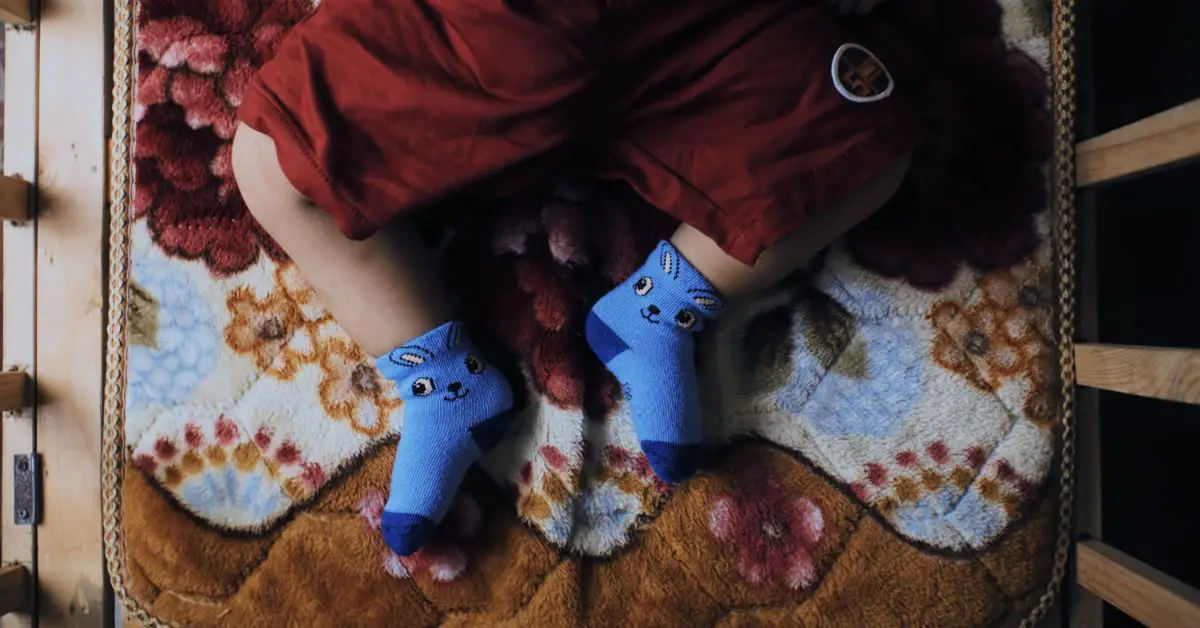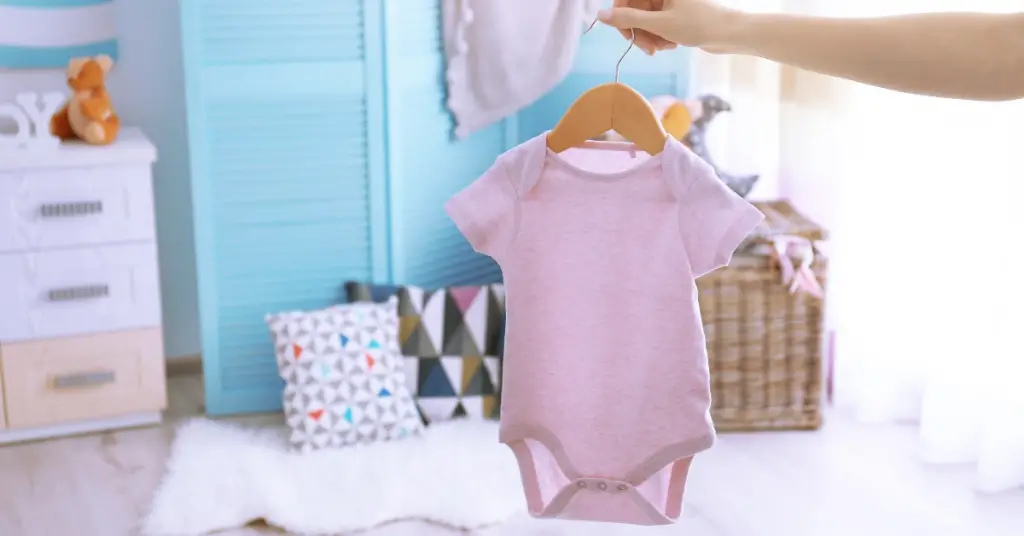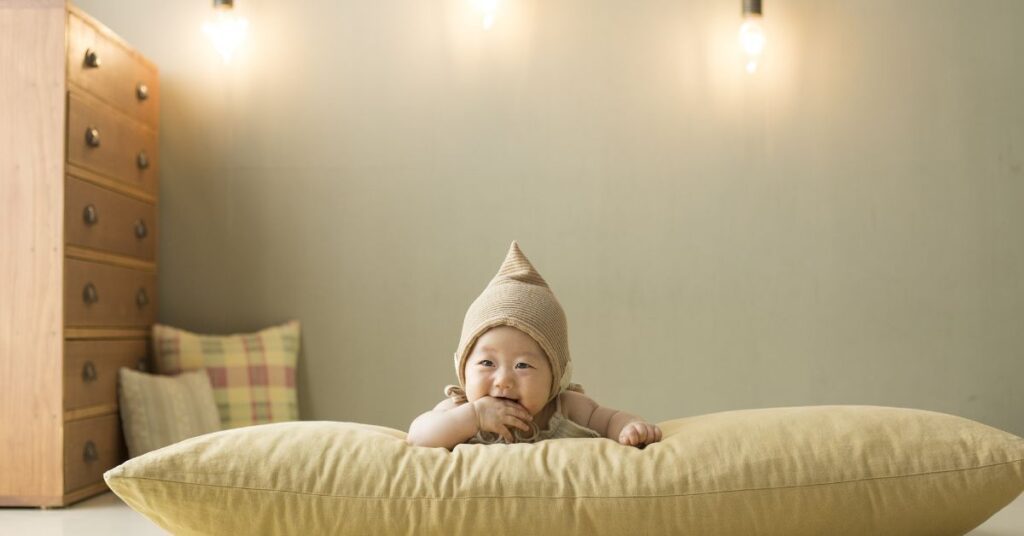Find out why babies kick their legs so much and our pro-tips to deal with the whale kicking phase.
The products mentioned on this page were independently selected by Babycious editors. As an Amazon Associate, Babycious may earn a commission from qualifying purchases.

Photo by Nothing Ahead
One of the most striking and adorable behaviors babies exhibit generally around three to four months old is kicking their legs, but it can drive you crazy to see (and hear) your little one get into the habit of throwing their legs straight into the air and slamming them down repeatedly. This behavior is not uncommon especially when babies are almost asleep or when they are excited. So why do babies kick their legs so much?
Leg kicking, especially when your baby is trying to fall asleep, is a self-soothing technique, and it is not uncommon for babies around four months old to get into the habit of kicking their legs, also known as “whale kicking”! It is also a way for babies to express themselves and communicate their excitement, need for attention, or discomfort usually related to gas issues.
Generally, if your baby is happy and kicking, it probably just means that you have an active baby with lots of energy in those legs. My daughter went through a phase of whale kicking at four months old where she would hold her legs up and slam them down on repeat all day. We called it her pro-wrestling signature move. She used to kick her legs so much that I would put her down in one direction in her crib just to find her in the completely opposite direction minutes later. If this is your case too, keep reading until the end for my best tips to deal with this wild and funny phase. But first, let’s explore the reasons behind this behavior and what it means for your baby’s development.
5 Reasons Why Babies Kick Their Legs so Much
Leg kicking or whale kicking can have different explanations depending on the particular situation your baby is in when they kick their legs. Here are 5 main reasons why babies kick their legs so much around the age of four months old:
Reason #1: A self-soothing technique
Leg kicking can usually be interpreted as a self-soothing technique commonly seen in babies around three to four months old. It is a way for them to relax and let go of their energy as part of their bedtime routine.
Kicking their legs may help your baby release their energy and tension before sleeping, and it is also a way for them to regulate their emotions through physical activity.
Reason #2: Exploring their surroundings
Leg kicking can also be a way for babies to explore the world around them. As babies start to become more mobile, they use their legs as a way to take in information from their environment such as textures, shapes, sizes, and even sounds. Kicking a toy with their legs, and making it move or make a sound, can be so fascinating for your baby.
This type of interaction helps babies develop their cognitive and sensory skills and can be very stimulating for them.
Reason #3: A part of their physical development
Kicking is also part of muscle development and strengthening, as babies are trying to strengthen the muscles in their legs and develop their balance and coordination in preparation for crawling or walking.
As your baby kicks their legs, they learn how to control and coordinate their movements and get a better grasp of what their body is capable of doing.
Leg kicking can also improve blood circulation which can be beneficial for muscle development.
Reason #4: Communicating excitement
Leg kicking can also indicate that your baby is in need of attention and want to be picked up or comforted, or; they may be trying to pull themselves up, which can lead to them kicking their legs out of excitement.
If your baby is kicking their legs during playtime or when they are excited, chances are they are trying to communicate their joy with you.
Reason #5: Gas discomfort
Sometimes leg kicking can be related to gas or digestive discomfort, as babies try to kick or move their legs in order to get trapped gas out of their bodies.
If your baby is upset when they are kicking their legs, they might be trying to move a gas bubble or they may be feeling some discomfort.
Pro-Tips to Deal with the Whale Kicking Phase
Having been through this wild and funny phase of whale kicking with my daughter, I have learned a few tricks on how to deal with it. Here are my best tips:
- Try the Rugby Hold. If you are breastfeeding (but also if you are bottle feeding or just holding your pro-wrestler baby), try the “Rugby Hold” (also known as the “clutch”). Instead of holding your baby on your lap, position your baby on a pillow along your side and support your baby’s head with the palm of your hand. This breastfeeding position was a lifesaver when my daughter got into the habit of kicking her legs so much even during feedings and I would receive the occasional kick right on my c-section scar.
- Teaching your baby empathy. If your baby kicks you (or other people) with their legs, it’s not too early to teach them that it hurts. Saying “Ouch, that hurt me” and making a sad face will help teach your baby empathy and that it is not appropriate to hurt other people.
- Use a sleep sack. If your baby is mostly kicking their legs when you put them down to sleep, I highly recommend Merlin’s Magic Sleepsuit. It will help your baby feel contained and more secure which might get them to relax and fall asleep without kicking their legs as much.
- Make sure your baby is getting enough physical activity during the day. If your little one is an energetic kicker, providing them with a Kick and Play Piano will keep your baby engaged while kicking the keys and making all sorts of sounds. Another great toy you can give your active baby is a jumperoo to spin and bounce safely in.
Bottom Line
Babies kick their legs for a variety of reasons, from emotional regulation to physical development, to sensory stimulation and communication. Kicking is a natural and important part of a baby’s development. And you can assist your baby in this whale-kicking phase by providing them with the right environment, toys, and physical activities to channel their energy.
I hope that understanding the reasons behind this behavior will help you be more tuned to your baby’s growth and development. If you have additional tips to deal with this phase, please share them with us in the comment section below!
The purpose of this article is informative and educational only. It’s not a substitute for medical consultation or medical care. We do not accept any responsibility for any liability, loss, or risk, personal or otherwise, incurred as a consequence, directly or indirectly, from any information or advice contained here. Babycious may earn compensation from affiliate links in this content.



